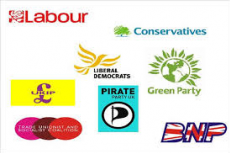
Email: ZYVC057@live.rhul.ac.uk
Total Article : 213
About Me:I'm a graduate student studying International Criminal Law and first started writing for King's News almost 4 years ago! My hobbies include reading, travelling and charity work. I cover many categories but my favourite articles to write are about mysteries of the ancient world, interesting places to visit, the Italian language and animals!

14+
In its most elementary form a party is ‘any political group that presents elections, and is capable of placing through elections, candidates for public office’ (Sartori 1976: 63). If we were to expand on this definition parties may be perceived as what was once the spirit of politics and reinforcement of democracy, as they embodied a just and stable medium linking people whom shared a certain political agenda with the political actions and procedures themselves. De facto this no longer appears to be the case as parties are gaining less members and less prominence than ever before. This has given way to a field of study in political science dedicated entirely to political behaviour, why people vote or why they decide not to.
‘Parteinverdrossenheit’, otherwise known as ‘vexation with parties’, was once a recurrent term in Germany, coined in 1992 to describe the failure of political parties within the Federal Republic. The word contained the bitter tone many had acquired in regards to the ridicule which had become of party politics whereby ‘parties are seen as overly self-interested, eternally squabbling instead of striving for common good, incapable of devising consistent policies, and prone to corruption’ (Poguntke 1996: 320). Today the concept of ‘parteinverdrossenheit’ may be extended to acquire an international outlook in line with the general trend of the decline of political parties, as party membership and active participation have witnessed severe cuts as parties have lost their prime communicational asset of medium. Overall the decline of parties has been of great concern in Britain which has witnessed the drop of members in the three main British parties. This is made evident by the sum of every member in the Conservative, Liberal Democratic and Labour parties, estimated to be around 570,000, which is still inferior to the number of subscribers and enthusiasts of the pressure group the Royal Society for the Protection of Birds pinned at an astounding number of 1,049,392.
Why the decline?
The decline in political parties can be caused by multiple reasons (also known as variables). Political parties are continuously evolving within the realm of politics and society. Pressure groups and new technological means of political communication such as blogging attract much more interest than parties which are known for their rigid structures, in some cases corruption, distrust and passive reaction to government policies as public figures become ever more influential, replacing parties as the main decision maker in regards to voting tendencies. This has led some scholars to argue that in fact even though parties are in decline it does not have a negative effect on democracy because parties are outdated and new forms of political engagement, like pressure groups, protests and boycotts are actually on the rise. Another reason for party decline is linked with the absence of an ideological gap between different parties. In fact in the past each British party distinctively represented a social class, e.g. Labour represented the working class, and this made it easier for citizens to be included in party politics as they subconsciously identified themselves with a party based on their social group. Now that party manifestos are pretty similar, especially in regards to less extreme parties, it is harder to citizens to decide which party to join. In countries worldwide parties are picked on for corruption, misinformation on issues and inefficiency to actually tackle what their manifesto states.
The debate surrounding whether party membership will increase is a hot topic, especially with UK elections just around the corner. Whilst some see parties as old fashioned and out-dated, other suggest that parties may be rehabilitated and emerge as dominant political institutions once again.
Image: http://d1bghp9m77ju8l.cloudfront.net/wp-content/uploads/2013/10/UK-Political-Parties.jpg

0 Comment:
Be the first one to comment on this article.